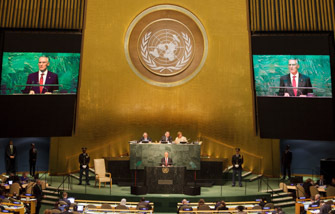

Mister Speaker
Excellency,
Having received, to be enacted as law, Parliamentary Decree No. 68/XI, which creates the procedure for change of sex and of forename in the civil registry and alters the Code of Civil Registration for the seventeenth time, I have decided, in the terms of article No. 136 of the Constitution, not to enact this bill, based upon the following premises:
1 – Opinions received from specialists in this issue occasion the belief that the regime submitted for enactment contains serious technical-juridical inadequacies and occasions a controversial framework in changes of gender identity. It would thus be desirable that Parliament should debate this anew in order to enable the congregation of the several opinions existing on a matter of such great relevance.
2 – The need for a juridical regime that rules, especially for the purpose of civil registration, the medically proven cases of change in gender identity that assume such a profile and type that would justify their becoming subject to the Law, is not placed in question.
3 – The juridical regime that rules this reality must congregate the clear and adequate legal solutions required to pursue two objectives: on the one hand, safeguard the reliability of the public registration system and, on the other, provide a swifter and more effective legal cover to those who demonstrably require it.
4 – Decree No. 68/XI, while not ensuring that such objectives are achieved, contributes, owing to the technical-juridical inadequacies it suffers, towards the condensation of situations of insecurity and uncertainty, unquestionably affecting those that are rigorously proven to possess a deranged gender identity.
5 – In the terms of the regime that Decree No. 68/XI aimed to establish, the official request to be placed with the civil registry to change sex and forename must be accompanied by a “medical report that proves the diagnosis of a deranged gender identity, also known as transsexualism, prepared by a multidisciplinary clinical team of clinical sexology based in a public or private, national or foreign, health establishment”.
6 – However, the bill under appreciation omits, from the start, details as to the criteria to be followed in the diagnosis of a deranged gender identity.
Without defining this derangement or even the criteria for diagnosis, the standard interpretation is entirely left to the free appreciation of the body that issues the report which, without due control, does not guarantee the technical rigour that must exist in cases that are particularly delicate for the safeguard of human dignity, as are those that occur in this area.
7 – Not by chance, in accordance with the criteria of the international classification of sicknesses – ICD10 – and also in accordance with the best practices followed in this area, the strict diagnosis of transsexualism is only considered as confirmed after its having been proven for, at least, two years of permanent derangement.
This is, anyway, the solution adopted, for example, by the law in force in Spain that demands, inclusively, two years of medical follow-up to adapt the physical characteristics to those of the intended sex.
8 – In the terms that Decree No. 68/XI proposed establishing, people suffering from gender identity derangement are unprotected relative to a possible error in diagnosis or even as to a rethinking of their decision to change sex – which, in the opinion of specialists, could occur in the initial stages of the referred derangement.
9 – Very awkward as well is the absence of criteria for the issue of a clinical report. In effect, if the official request is accompanied solely by this report and the registrar is unable to substantially exercise control over it, it would be necessary that the law be more demanding as to the conditions covering its issue.
However, in the terms of the approved regime, the report is prepared by a “multidisciplinary clinical team of clinical sexology originating from a public or private, national or foreign, health establishment”..
It is thus possible that professionals without the required specialization or any type of preparation for accompanying cases of this kind, as a rule very complex, could constitute this multidisciplinary team – the composition of which the decree does not specify – and issue certificates that will be obligatorily followed by the registrar for the purpose of change of sex and name in the registration. In effect, clinical sexology does not correspond to a medical speciality recognized in Portugal, and the decree equally omits details as to the professional qualifications of the psychologist included in the referred team.
Worse still, the same report may be issued in a public or private, even foreign, health establishment, by physicians whose qualifications are not recognized or even controlled by the Portuguese authorities – contrary, for instance, to the provisions of the laws in force in Spain or in the United Kingdom. As such, there is no possibility to submit such professionals to a minimum compliance of ethical and deontological rules, with clear prejudice for the public interest and for the rights and interests of those who intend to achieve a change in sex.
10 – Further still, the negative effects of this regime are not negligible in the case of the legal system, specifically in the confidence that must unquestionably be associated with the public registry system.
The real objective of registration is to provide publicity for certain facts. For this reason, the regime of Decree No. 68/XI includes changing the annotation in the civil registration in order to bring the registered gender into line with the appearance shown by the person.
However, due to the above reasons, the complete absence of legal consistency (as in the concept of identity gender derangement or of the diagnosis criteria) makes the registration, undesirably, a source of juridical insecurity and uncertainty. To allow a sex change in cases that are not proven or the diagnosis of which may be shown as insufficient will be very detrimental for the public confidence in the registration system.
11 – As such, the regime to be approved in this issue must not, in any way, owing to its technical-juridical deficiencies and to its absence of clarity and consistency, contribute to worsen the situation of whoever suffers from gender identity derangement, a situation that, it should be stressed, is frequently surrounded by dramatic contours as to individual self-fulfilment and as to the right to the free development of personality
12 – Lastly, in a matter of this delicacy and complexity, where there is little knowledge of what is really at issue – predominantly, a clinical derangement – it is important that the community understands the sense and the reach of what is meant by the lawmaker, and this must stand out by its technical-juridical correctness and by a real concern as to the safeguard of peoples’ rights and interests.
This does not obviously occur in Decree No. 68/XI, and is the reason why I am returning it to Parliament without enactment, in order that the matter be submitted to a deeper analysis by its Members, envisaging an adequate consideration of interests that may demonstrably be shown as deserving of the Rule of Law.
With highest regards,
Palace of Belém, 6 January 2011
THE PRESIDENT OF THE REPUBLIC
Aníbal Cavaco Silva
© 2006-2016 Presidency of the Portuguese Republic
You have gained access to the records of the Official Site of the Presidency of the Republic from 9 March 2006 to 9 March 2016.
The contents available here were entered in the site during the 10 year period covering the two mandates of President of the Republic Aníbal Cavaco Silva.